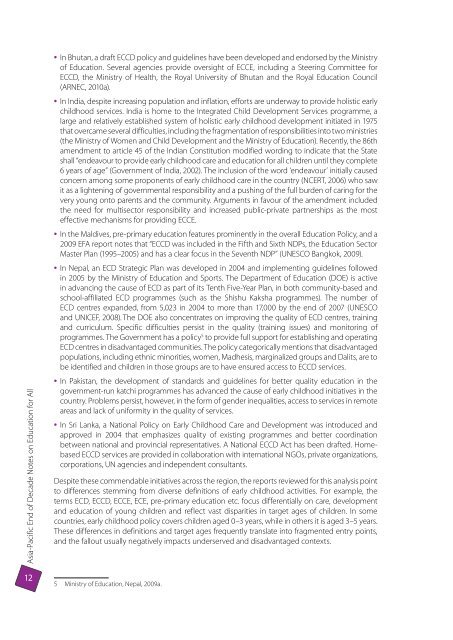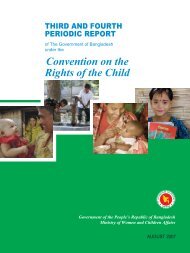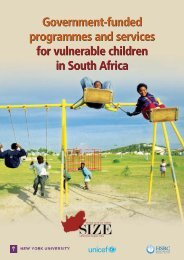EFA Goal 1: Early childhood care and education; Asia ... - Unicef
EFA Goal 1: Early childhood care and education; Asia ... - Unicef
EFA Goal 1: Early childhood care and education; Asia ... - Unicef
Create successful ePaper yourself
Turn your PDF publications into a flip-book with our unique Google optimized e-Paper software.
<strong>Asia</strong>-Pacific End of Decade Notes on Education for All<br />
In Bhutan, a draft ECCD policy <strong>and</strong> guidelines have been developed <strong>and</strong> endorsed by the Ministry<br />
of Education. Several agencies provide oversight of ECCE, including a Steering Committee for<br />
ECCD, the Ministry of Health, the Royal University of Bhutan <strong>and</strong> the Royal Education Council<br />
(ARNEC, 2010a).<br />
In India, despite increasing population <strong>and</strong> inflation, efforts are underway to provide holistic early<br />
<strong>childhood</strong> services. India is home to the Integrated Child Development Services programme, a<br />
large <strong>and</strong> relatively established system of holistic early <strong>childhood</strong> development initiated in 1975<br />
that overcame several difficulties, including the fragmentation of responsibilities into two ministries<br />
(the Ministry of Women <strong>and</strong> Child Development <strong>and</strong> the Ministry of Education). Recently, the 86th<br />
amendment to article 45 of the Indian Constitution modified wording to indicate that the State<br />
shall “endeavour to provide early <strong>childhood</strong> <strong>care</strong> <strong>and</strong> <strong>education</strong> for all children until they complete<br />
6 years of age” (Government of India, 2002). The inclusion of the word ‘endeavour’ initially caused<br />
concern among some proponents of early <strong>childhood</strong> <strong>care</strong> in the country (NCERT, 2006) who saw<br />
it as a lightening of governmental responsibility <strong>and</strong> a pushing of the full burden of caring for the<br />
very young onto parents <strong>and</strong> the community. Arguments in favour of the amendment included<br />
the need for multisector responsibility <strong>and</strong> increased public-private partnerships as the most<br />
effective mechanisms for providing ECCE.<br />
In the Maldives, pre-primary <strong>education</strong> features prominently in the overall Education Policy, <strong>and</strong> a<br />
2009 <strong>EFA</strong> report notes that “ECCD was included in the Fifth <strong>and</strong> Sixth NDPs, the Education Sector<br />
Master Plan (1995–2005) <strong>and</strong> has a clear focus in the Seventh NDP” (UNESCO Bangkok, 2009).<br />
In Nepal, an ECD Strategic Plan was developed in 2004 <strong>and</strong> implementing guidelines followed<br />
in 2005 by the Ministry of Education <strong>and</strong> Sports. The Department of Education (DOE) is active<br />
in advancing the cause of ECD as part of its Tenth Five-Year Plan, in both community-based <strong>and</strong><br />
school-affiliated ECD programmes (such as the Shishu Kaksha programmes). The number of<br />
ECD centres exp<strong>and</strong>ed, from 5,023 in 2004 to more than 17,000 by the end of 2007 (UNESCO<br />
<strong>and</strong> UNICEF, 2008). The DOE also concentrates on improving the quality of ECD centres, training<br />
<strong>and</strong> curriculum. Specific difficulties persist in the quality (training issues) <strong>and</strong> monitoring of<br />
programmes. The Government has a policy 5 to provide full support for establishing <strong>and</strong> operating<br />
ECD centres in disadvantaged communities. The policy categorically mentions that disadvantaged<br />
populations, including ethnic minorities, women, Madhesis, marginalized groups <strong>and</strong> Dalits, are to<br />
be identified <strong>and</strong> children in those groups are to have ensured access to ECCD services.<br />
In Pakistan, the development of st<strong>and</strong>ards <strong>and</strong> guidelines for better quality <strong>education</strong> in the<br />
government-run katchi programmes has advanced the cause of early <strong>childhood</strong> initiatives in the<br />
country. Problems persist, however, in the form of gender inequalities, access to services in remote<br />
areas <strong>and</strong> lack of uniformity in the quality of services.<br />
In Sri Lanka, a National Policy on <strong>Early</strong> Childhood Care <strong>and</strong> Development was introduced <strong>and</strong><br />
approved in 2004 that emphasizes quality of existing programmes <strong>and</strong> better coordination<br />
between national <strong>and</strong> provincial representatives. A National ECCD Act has been drafted. Homebased<br />
ECCD services are provided in collaboration with international NGOs, private organizations,<br />
corporations, UN agencies <strong>and</strong> independent consultants.<br />
Despite these commendable initiatives across the region, the reports reviewed for this analysis point<br />
to differences stemming from diverse definitions of early <strong>childhood</strong> activities. For example, the<br />
terms ECD, ECCD, ECCE, ECE, pre-primary <strong>education</strong> etc. focus differentially on <strong>care</strong>, development<br />
<strong>and</strong> <strong>education</strong> of young children <strong>and</strong> reflect vast disparities in target ages of children. In some<br />
countries, early <strong>childhood</strong> policy covers children aged 0–3 years, while in others it is aged 3–5 years.<br />
These differences in definitions <strong>and</strong> target ages frequently translate into fragmented entry points,<br />
<strong>and</strong> the fallout usually negatively impacts underserved <strong>and</strong> disadvantaged contexts.<br />
12<br />
5 Ministry of Education, Nepal, 2009a.

















